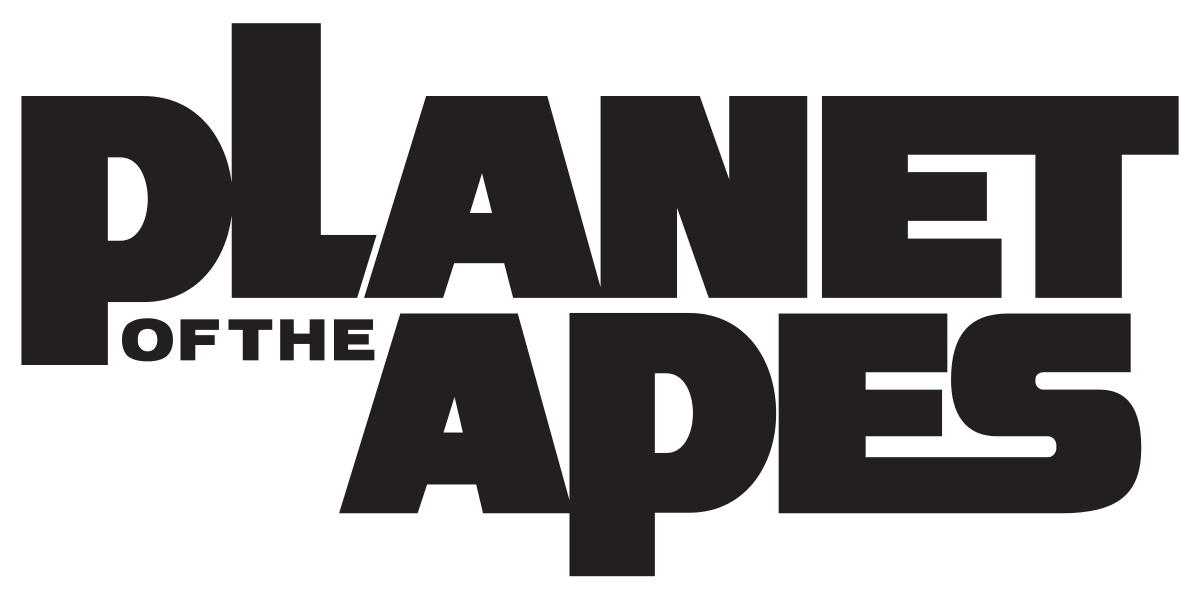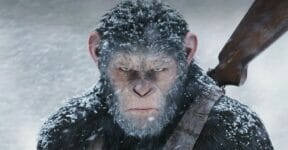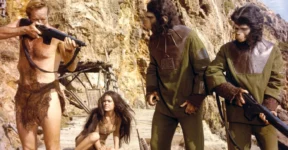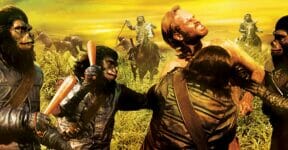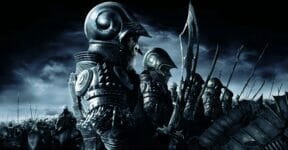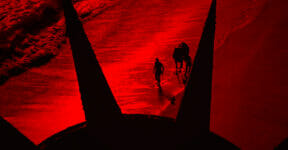Pierre Boulle’s 1963 sci-fi novel, Planet of the Apes (published in the UK as Monkey Planet) is a stand-alone work. It is not part of a trilogy or any book series in existence. However, the 1968 film adaptation of the same name directed by Franklin J. Schaffner, kicked-off a decades long continuation spawning four sequels, two TV series, a reimagining, and a reboot trilogy thus far. Nearly every screen adaptation has its own novelization, and the POTA series is one of them. Check out everything you need to know about the Planet of the Apes books now!
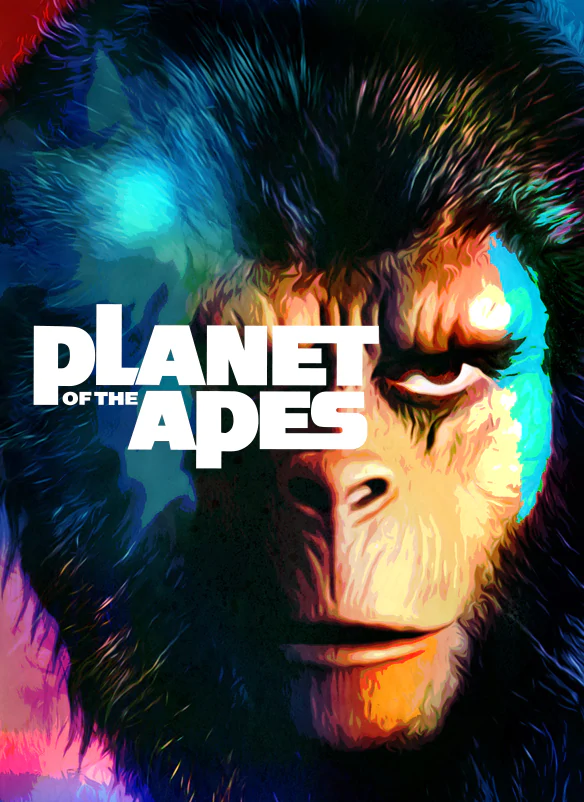
There have also been plenty of tie-ins, spinoffs, and crossover comics and graphic novels for the Planet of the Apes films by various publishers. For the sake of simplicity, the discussion covers mainly the official novelizations for the existing films and TV series along with supplemental materials that bridge any gaps between individual titles.
A Convenient Reading Order
As a film franchise, Planet of the Apes follows a simple progression: the first film is the beginning, followed by a series of sequels. The TV series essentially tells the same story with different characters and settings. A reimagined version of the original neither changes the main elements nor affects the timeline by much. A reboot version (consisting of three films as of Dec 2022, with another currently in production), recreates the story of Caesar, the main ape character in the last two films of the original pentalogy.
Titan Books secured the license to publish the Planet of the Apes books in 2014. The company has since released numerous new novels and re-released collections of older works from other publishers, creating a coherent timeline for readers.
1. Planet of the Apes by Pierre Boulle (1963)

According to Rod Serling, the screenwriter for Planet of the Apes (1968) and creator of the film’s iconic epilogue, Pierre Boulle did not really have the specialty for sci-fi. Serling might have been right as the novel does read more like a lengthy allegory of morality than a full-blown imaginary tale sprinkled with theoretically feasible technological advances of the future. In an unusual way, the film’s unfaithfulness to the source material—including the ending—is good. Even for those who have watched the feature many times, Boulle’s Planet of the Apes is a fantastic read on its own.
2. Death of the Planet of the Apes by Andrew E. C. Gaska (2018)

George Taylor did not appear in the first sequel of the original pentalogy, Beneath the Planet of the Apes, until the climactic scene. Death of the Planet of the Apes contains the official exploits of George Taylor in between the first two films’ endings. The book also offers a flashback to Taylor’s days as fighter pilot until he embarked on the one-way time travel trip.
3. Planet of the Apes Omnibus 1 (2017)
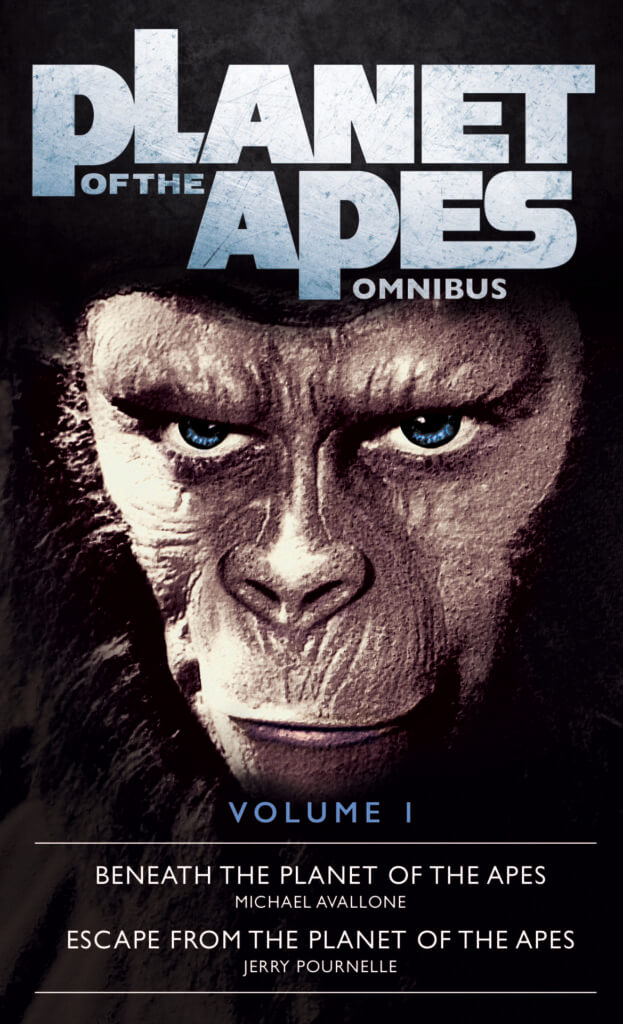
The first omnibus edition published by Titan Books contains the official novelizations for Beneath the Planet of the Apes (1970) by Michael Avallone, and Escape from the Planet of the Apes (1973) by Jerry Pournelle. Both stories offer slightly alternative takes on the well-known plotlines in the films. Avallone depicts the future world on the brink of civil war between the chimpanzee and gorilla factions, whereas Pournelle delivers a role-reversal in which three ape astronauts (Cornelius, Zira, and Milo) appear in 1973.
4. Planet of the Apes Omnibus 2 (2017), 1st and 2nd parts

The second omnibus carries the novelizations for three films. Only two are mentioned here at this point for the sake of chronology: Conquest of the Planet of the Apes (1974) by John Jakes and Battle for the Planet of the Apes (1973) by David Gerrold. One of the most notable parts of Jake’s novelization is how it retains the original ending in which the apes execute a man in a violent fashion. On the other hand, the novelization for the concluding film by Gerrold is almost entirely adapted from the shooting script instead of the screenplay.
5. Planet of the Apes Omnibus 3 (2017)
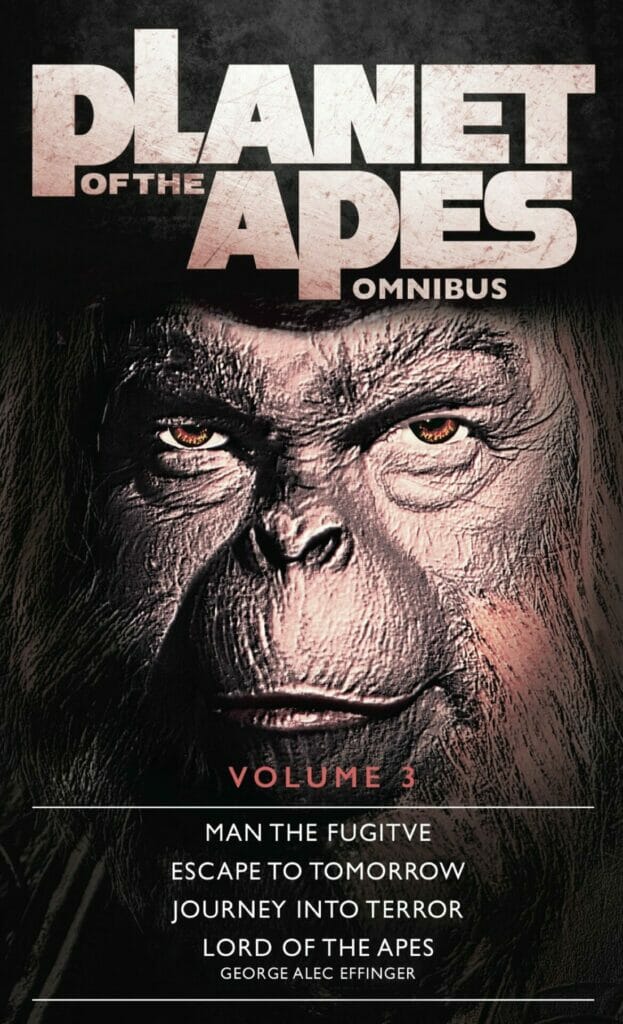
Also published by Titan Books in 2017, the third omnibus contains the novelizations for the TV series’ episodes, including:
· Man the Fugitive – The Good Seeds and The Cure (episodes 4 and 12)
· Escape to Tomorrow – The Surgeon and The Deception (episodes 7 and 8)
· Journey Into Terror – The Horse Race and The Legacy (episodes 9 and 5)
· Lord of the Apes – The Gladiators and The Tyrant (episodes 2 and 11)
Every volume was written by George Alec Effinger, and originally published by Award Books in 1974. The remaining 6 episodes have not been officially novelized.
6. Planet of the Apes Omnibus 4 (2018)
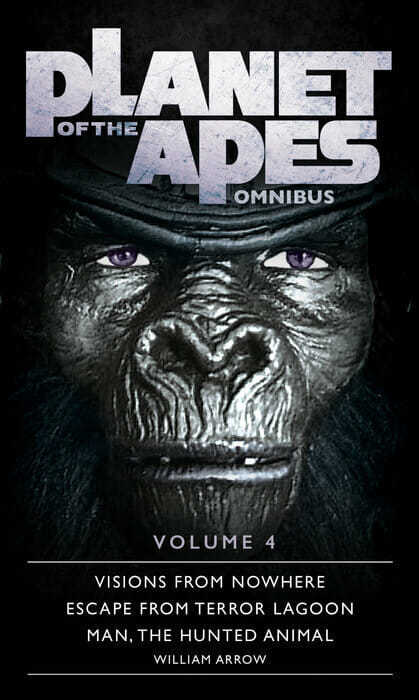
Another omnibus (from Titan Books) collects the novelizations for Return to the Planet of the Apes animated TV series including:
· Visions From Nowhere – Flames of Doom, Escape from Ape City, and The Unearthly Prophecy (episodes 1 – 3)
· Escape From Terror Lagoon – Tunnel of Fear, Lagoon of Peril, and Terror on Ice Mountain (episodes 4 – 6)
· Man, the Hunted Animal – River of Flames, Screaming Wings, and Trail to the Unknown (episodes 7 – 9)
Only 9 of 13 episodes have been officially novelized. Every volume was written by William Arrow, and originally published by Ballantine Books in 1976.
7. Tales from the Forbidden Zone (2017)
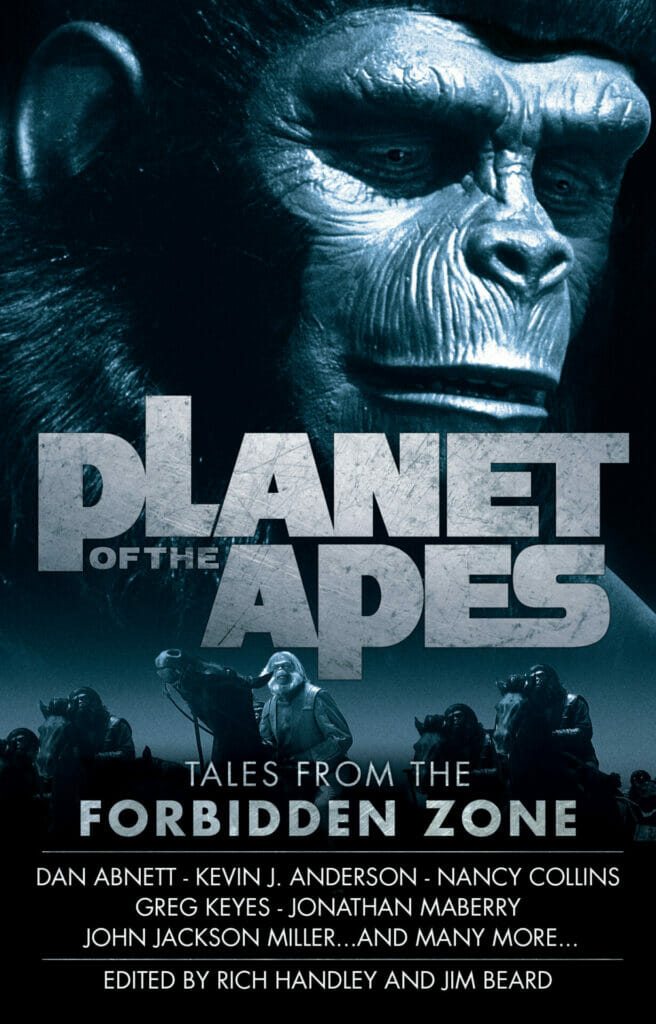
Titan Books published an anthology, Tales from the Forbidden Zone, in 2017. It consists of 16 new stories written by 17 different writers, including Andrew E.C. Gaska and Rich Handley. All stories are in the continuity of the original pentalogy and two TV series. Some stories offer deeper insights into known characters, while others fill the gaps in the timeline or deliver imaginary tales within the fictional world.
8. Planet of the Apes Omnibus 2 (3rd part)
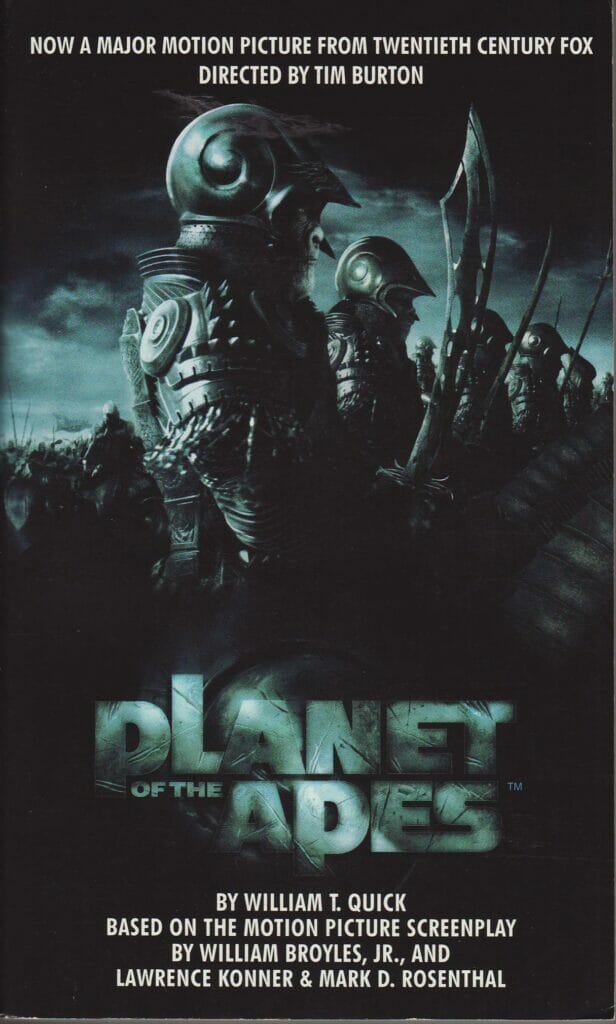
An official stand-alone novelization for Tim Burton’s remake was originally published by HarperCollins in 2001. The book does not stray too far from the film, except that it does not include the latter’s puzzling ending. However, it gives more of the different characters’ inner thoughts and detailed developments, too. Since 2017, it has been available as the third part of Titan Book’s Planet of the Apes Omnibus 2.
9. Dawn of the Planet of the Apes: Firestorm (2014)
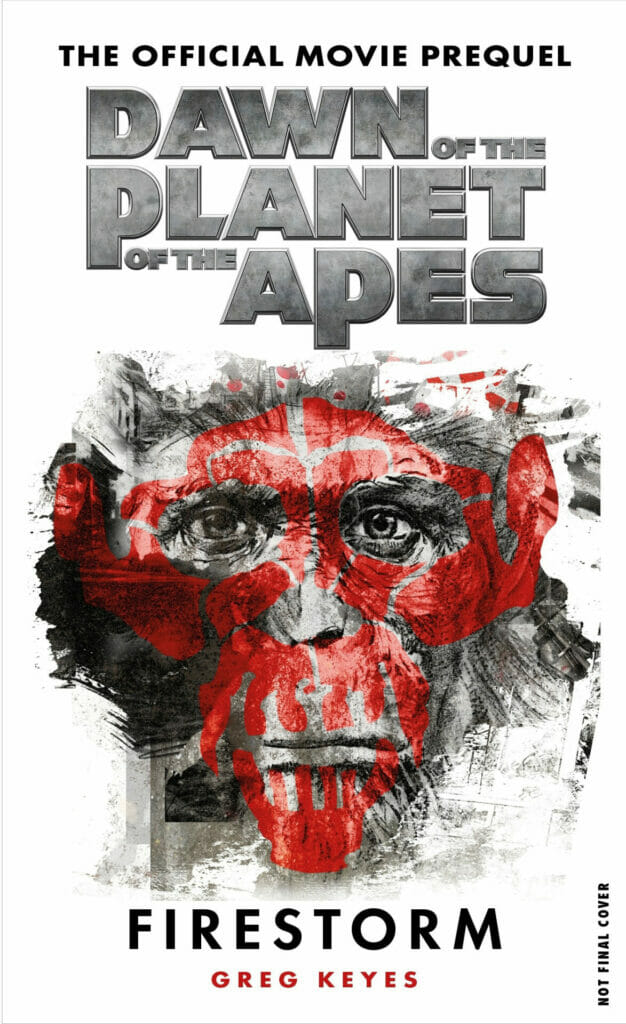
The narrative in the book is built on two major issues: the government’s attempts to cover up the riot on the Golden Gate Bridge and the impacts of simian flu. Most human characters die before the story ends. Firestorm bridges the gap between Rise of the Planet of the Apes and Dawn of the Planet of the Apes, the first two films in the reboot series.
10. Dawn of the Planet of the Apes (2014)
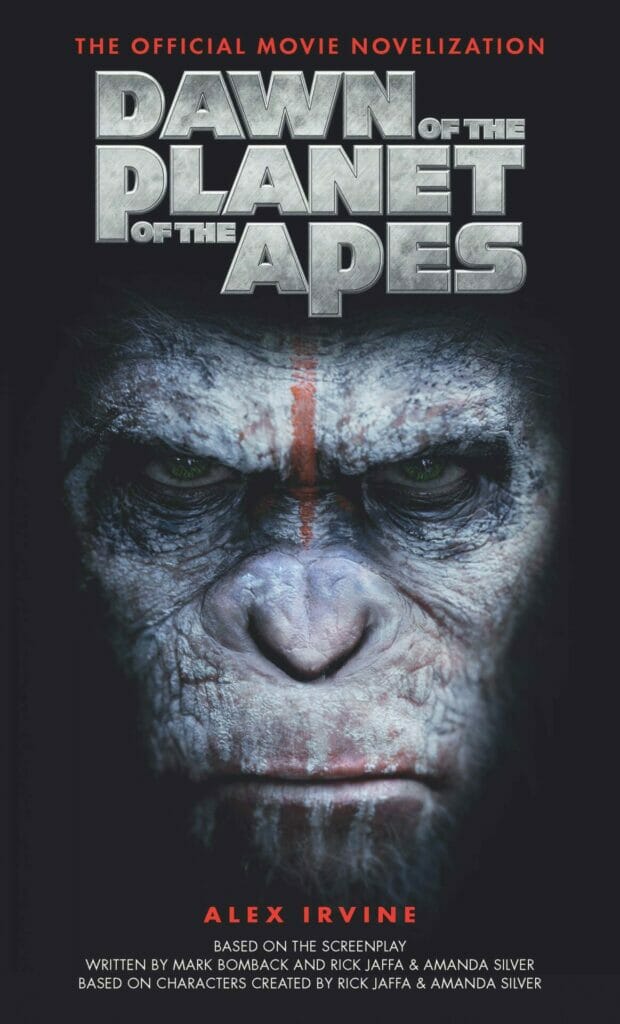
In terms of plotline, there isn’t much of a difference between the official novelization and the film. However, the book benefits from already well-received source material and develops noteworthy background elements and character perspectives. Also, it offers a different ending from the theatrical version.
11. War for the Planet of the Apes: Revelations (2017)
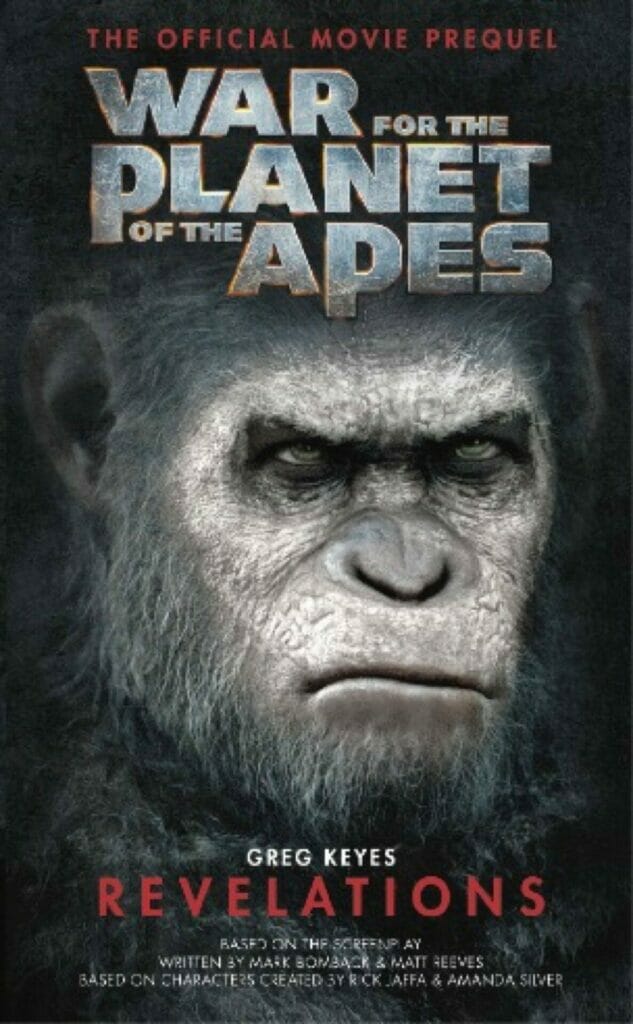
Written by Greg Keyes, also the author of Firestorm, a prequel novel to War for the Planet of the Apes is aptly titled Revelations. The main focus of the book is not Caesar but his son Blue Eyes on a scouting mission to find a place for the apes to live in peace. It offers a sizable introduction to Colonel McCullough and his personal take on why humans and apes cannot coexist as equal ruling species.
12. War for the Planet of the Apes (2017)
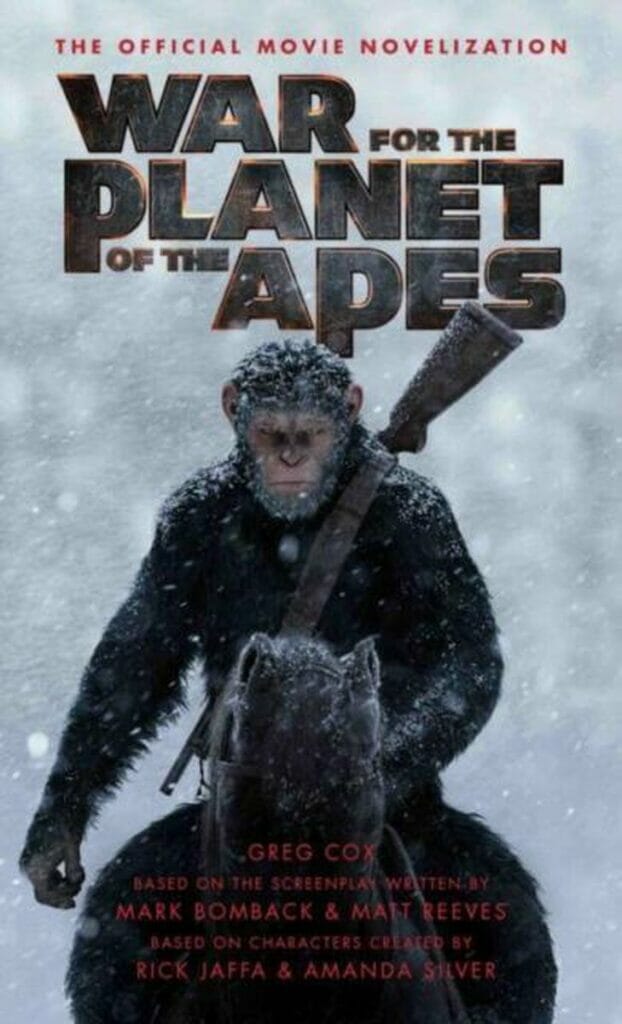
A novelization for the latest film in the reboot series is authored by Greg Cox. It stays relatively close to the screen version, although there are some notable differences as well. The biggest and most memorable distinction is the ending, in which the book tosses in an idea that the apes find a place completely devoid of humans; the place is called the Forbidden Zone.
13. Caesar’s Story (2018)
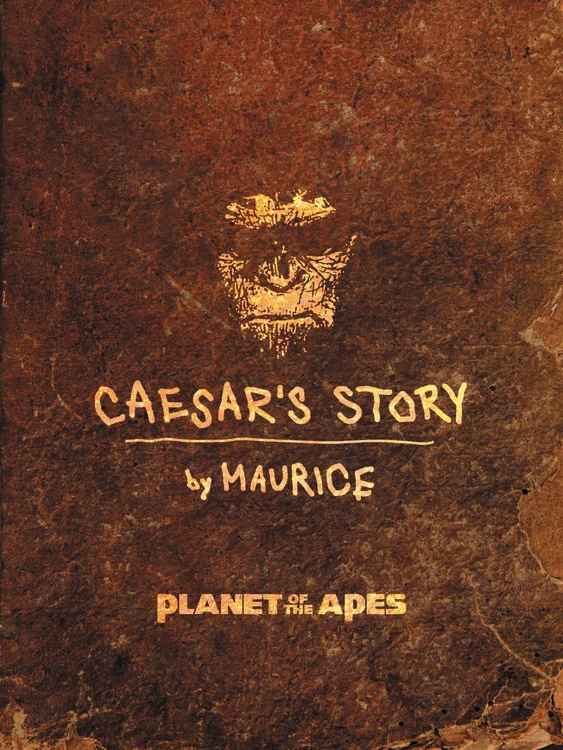
As the title suggests, the book is a biography of Caesar. It is supplemental material published by Hachette Books, describing the story of his life, told from the perspective of Maurice, his most trusted companion. A large portion of the book chronicles Caesar’s journey during the three reboot films. It starts from his early days as a lab ape and under the care of Will Rodman until his death.
We can’t get enough of the Apes series, whether it’s the books, the TV shows, or the movies. For us, Beneath the Planet of the Apes is our favorite, probably because of the ending. We are Stories At Worlds End, after all.
How about you? Which is your favorite? Do you even like the series? Let us know. We’d love to hear from you.
If you liked this, then check out Battle For The Planet Of The Apes 1973: Are These Movie Reviews Justified?
Other things you might want to know about.
Who is Pierre Boulle?
According to bbc.com Pierre Boulle was a French novelist whose life and works are kept alive by Jean Loriot who heads the Association of Friends of Pierre Boulle. Two of Boulle’s novels were made into movies. One being The Planet of the Apes and the other The Bridge on the River Kwai, which was his third novel. Loriot says that the theme of all of Boulle’s works was about the relativity of good and evil.
For much more on this author go to bbc.com and read this interesting article about Pierre Boulle. It’s title is “The French spy who wrote The Planet of the Apes” by Hugh Schofield dated August, 2014. It’s a fascinating read about a very talented writer and countryman.
What did Rod Serling have to do with Planet of the Apes?
According to rodserling.com in 1963 Serling was hired by King Brothers Productions to write a screenplay based on a novel called Planet of the Apes by Pierre Boulle. Serling was an accomplished TV writer, but he struggled for over 2 years trying to adapt the complex story for the big screen. In 1965 he submitted the final draft. In the meantime they had to raise the funds to make the movie, which took 2 more years. Another writer named Michael Wilson, was brought in to work on the script. In 1968 both men shared screen credit for writing the script.
Go to rodserling.com and read the article called “Mythbusting the Original Planet of the Apes” for more interesting facts about the making of this movie and the writers.
Charlton Heston and Planet of the Apes
According to inthatmovie.com here are some facts about Charlton Heston
- Heston was 44 when he made Planet of the Apes in 1968.
- Director Franklin J Schaffner worked with Heston 2 times in his career.
- Heston’s first movie was “Peer Gynt” when he was 16.
- Planet of the Apes scored 7.64 out of 10 on TMBD.

